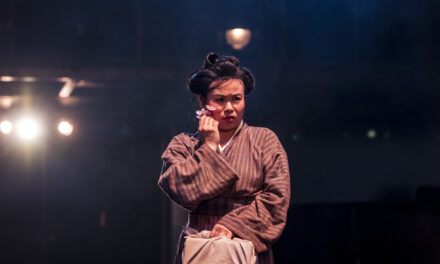The tent poles of Little Women are planted firmly in Christmas. The drama’s canopy extends from one Yuletide to the next, and beneath that canvas the lives of the March women are played out.
In like fashion, HOME’s production for the season, adapted by Anne Marie Casey and directed by Brigid Lamour, must contend with the ghosts of numerous Christmases past. Louisa May Alcott’s well-beloved semi-autobiographical novel, first published in 1868, has seen a number of similarly-cherished iterations, both in television and film. Their spectres continue to loom dauntingly in the collective recollection.
Such figures as Katharine Hepburn and Saoirse Ronan, both of whom have portrayed Jo, Alcott’s surrogate in the story, can be hard to measure up to, not only in terms of their star quality but also in the way they fix definite expectations of the character, potentially hobbling fresh interpretations.

Kacey Ainsworth in Little Women. Photo by Chris Payne.
To conclude then that HOME’s production is not quite the equal of, for example, Greta Gerwig’s 2019 film, is to cast no aspersion on Casey’s adaptation, which is structured with an attentiveness to Alcott that speaks of an almost reverent attachment. As well as entering into a kind of loving correspondence with the novel, Casey’s script gently foregrounds those of its themes which remain most pressing in their relevance today. The Marches, with their never-seen father, ministering as a chaplain to the Union forces in the American Civil War, and their determined kindness towards immigrant neighbours, the Hummels, are incontrovertibly on the right side of history.
Nor can the cast be readily faulted. In particular, Susan Twist as Aunt March brings something of the formidable hauteur of The Importance Of Being Earnest’s Lady Bracknell to her stern disapprobation of the notion that young folk should be left to balance the ledgers of matrimonial alliance without the meddling of their betters. Her decisive intervention in tutor John Brooke’s proposal to Meg, albeit one with an outcome the exact opposite of the one she intends, is a particular comedic highlight.
Lamour’s direction contrives a number of fine effects, in particular the convincing realisation of Jo’s wilful complicity in Amy’s ice-skating accident and the release of Beth’s gentle soul.
The decision to emphasise the female characters is of a piece with Alcott, and while it leaves Daniel Frances-Swaby the difficult task of lending translucency to a rather opaque Laurie, the production’s curiosity about the double-edged liberties afforded to women in life during wartime is arguably also one of its strengths.

Little Women. Photo by Chris Payne.
All the same, there is a sense of something missing. The characters, with the exception of Julia Brown’s Amy, making the painful second act realisation that she is unable to live up to her childhood dreams of artistic genius, remain rather too close to their teenage selves, more credible when little than as women. Vivid in their Brontë-like hothouse of creativity as adolescents, and credible in the tempest of their sibling rivalries, they seem, on the whole, somehow less complete as adults. When Jo does walk into the ‘helpmate in life who loves her’ that Kacey Ainsworth’s Marmee has augured, for all that she is able to recite Keats in unison with him, the two seem more literary pals than soulmates whose mutual understanding the audience can emotionally invest in.
The overall effect, curiously enough, is of a certain lack of consequence, keeping the characters in a sort of imaginary past tense when, tantalisingly, at times they are on the threshold of a more compelling present.
Main image by Chris Payne



Little Women is at HOME, Manchester until December 23, 2024. For more information, click here.








